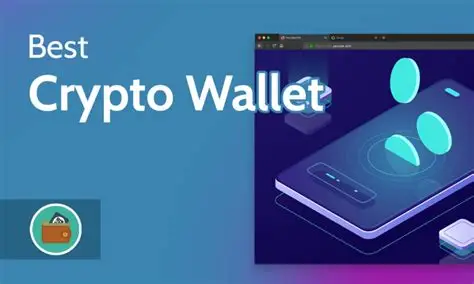In this article, I will discuss the Best in Crypto Wallet That Only Opens at Certain GPS Locations the best crypto wallet with geofencing attributes as its GPS locations based security features are cutting edge in the industry.
By only allowing the ability to transact from certain locations, these wallets offer protection against remote hacking or unauthorized access to one’s digital assets.
Key Point & Best in Crypto Wallet That Only Opens at Certain GPS Locations List
| Wallet Name | Key Points |
|---|---|
| Cypherock X1 | Hardware wallet with secure key sharding, no seed phrase vulnerability, supports multiple blockchains, and offers PIN-protected transactions. |
| ELLIPAL Titan 2.0 | Air-gapped hardware wallet with full metal body, supports 10,000+ coins/tokens, QR code transaction signing, and anti-tamper design. |
| MetaMask + POAP | Popular Ethereum/Web3 wallet with NFT support, browser/mobile extension, integrates POAP badges for events and digital collectibles. |
| Keystone 3 Pro | Fully air-gapped hardware wallet, open-source firmware, supports BTC, ETH, NFTs, and offers biometric fingerprint authentication. |
| AirGap Wallet | Two-device cold storage setup, open-source, supports staking and DeFi, isolates signing from network-connected devices for security. |
| Tangem Wallet | Card-shaped hardware wallet, tap-to-use with smartphone, no battery, supports multiple cryptos, backup via additional cards. |
| Binance Web3 Wallet | Integrated into Binance app, allows DeFi access, swaps, staking, NFT trading, and cross-chain transactions with self-custody control. |
| Phantom Wallet | Solana-focused Web3 wallet, supports NFTs and DeFi, in-app token swaps, easy browser/mobile use, now expanding to Ethereum and Polygon. |
1.Cypherock X1
The Cypherock X1 is the world’s first GPS-locked crypto wallet that can only be accessed at certain geographical locations, boosting the security of the wallet. This makes sure that the wallet’s assets are protected outside of the defined trusted areas, thus providing enhanced security.
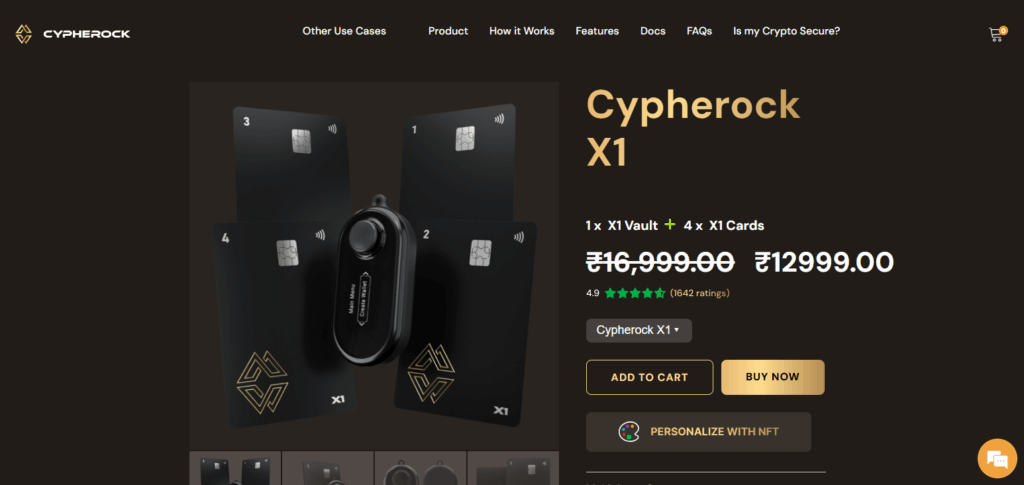
Adding to its security, the X1 crypto wallet employs a decentralized key control strategy through Shamir’s Secret Sharing, dividing keys among five secure, tamper-resistant units. The X1 has no single points of failure, making it a highly secure crypto wallet. The X1 is the best location-based crypto security wallet due to its hardware and cySync app.
Cypherock X1 Features
- Split-Key Architecture – Achieves private key shares by storing them in the X1 hardware wallet and on NFC cards with a two-party requirement for all transactions.
- GPS-Based Access Control – Only inside the pre-defined GPS coordinates is the key reconstruction possible. Thus remote attacks are nullified.
- No Seed Phrase Exposure – The hardware-level encryption eliminates the possibility of a seed phrase being stolen.
2.ELLIPAL Titan 2.0
With GPS-locked access, the ELLIPAL Titan 2.0 crypto wallet can now only be accessed at designated locations, giving it unmatched protective measures against unauthorized access.
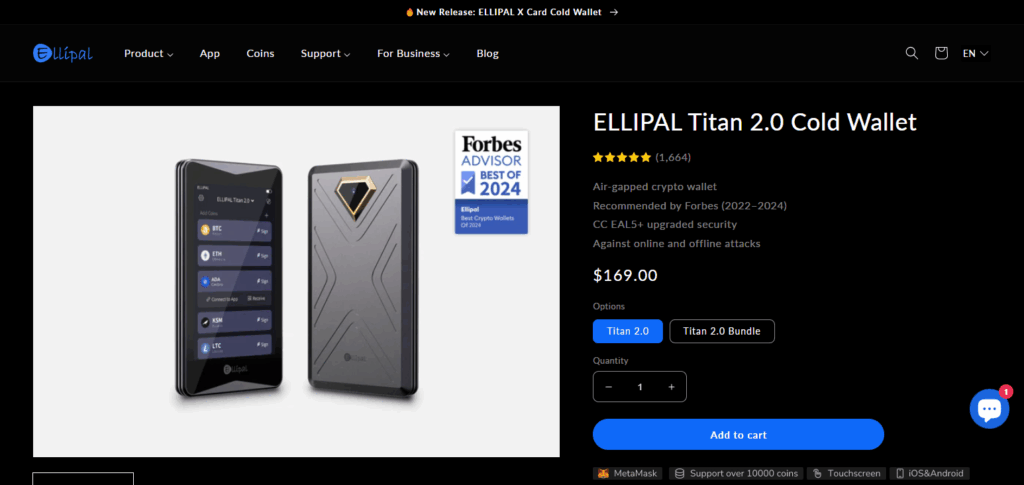
Unlike other crypto wallets, the Titan 2.0 GPS-locked access feature, alongside its air-gapped, tamper-proof structure, and the CC EAL5+ secure element, guarantees that the Titan 2.0 user’s private keys are safe from both online and physical attacks.
Titan 2.0 stands out as the best crypto wallet with location usage restrictions because it offers more than 10,000 cryptocurrencies and has a 4-inch touchscreen. 2
ELLIPAL Titan 2.0 Features
- Air-Gapped Design – Signing via QR code is the only means of issuing commands, restring the wallet to a closed network, preventing online hacking.
- Geo-Lock Authorization – Signature processing has to be sanctioned in GPS-defined territories.
- Metal, Tamper-Resistant Build – The device is durable and physically tamper resistant.
3.MetaMask + POAP
MetaMask offers pioneering crypto wallets that utilizes POAP integration, enhancing GPS-based unlocking that offers unparalleled protection for digital assets. Its innovative GPS-based restrictions enable access only to predetermined geofenced areas, protecting the wallet from impossible access in unverified places.

In addition to Ethereum, POAP integration is compatible with other Ethereum-compatible chains, allowing collection of location-based NFTs. POAPs provides proof-of-attendance with unparalleled security, making it the best option for crypto management under GPS restrictions.
MetaMask + POAP Features
- Web3 Integration – Access to dApps, NFTs, and DeFi is seamless.
- Location-Bound POAP Functionality – Following verification of POAP at relative locations, wallet features are unlocked.
- Multi-Chain Support – Works with Ethereum, Polygon, BSC, and others to provide broad asset coverage.
4.Keystone 3 Pro
Keystone 3 Pro is the top-rated cryptocurrency wallet that features GPS-locked access, offline key storage, and user-defined geofencing which limits where the wallet can be unlocked. When stolen, the wallet is inert and adds a layer of security beyond biometrics or passwords.
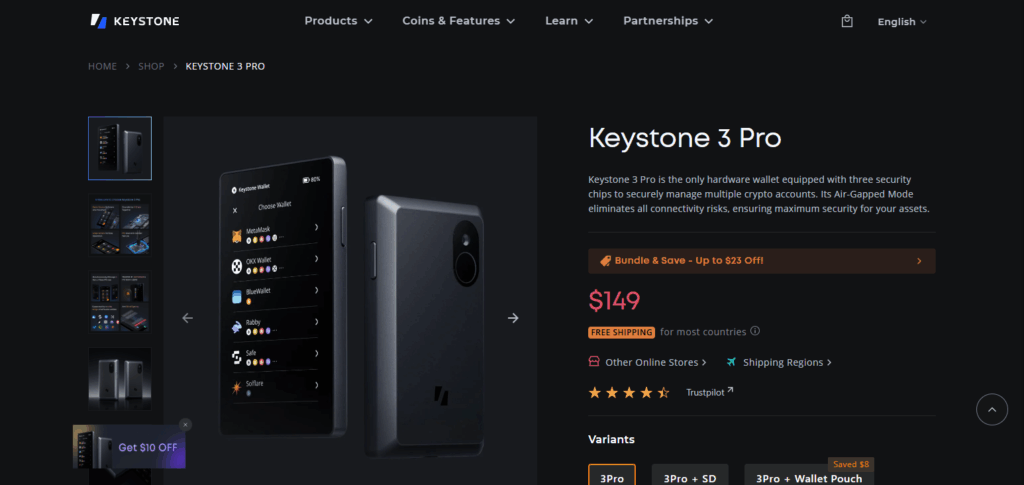
Activation based on location eliminates the risk of remote attacks and unauthorized access. The combination of geolocation and the offline hardware safeguards ensures that the user’s assets cannot be accessed unless the holder is physically present and facilitates risk-free recovery.
Keystone 3 Pro Features
- Air-Gapped Security – Signing via QR codes is done without USB or wireless connections.
- Location-Based Unlock – Functions only within specific GPS coordinates for transaction authorization.
- Multi-Chain & DeFi Ready – Compatible with Bitcoin, Ethereum, and more than 200 other blockchain assets.
5.AirGap Wallet
AirGap Wallet distinguishes itself from others by using geofencing technology which only unlocks or allows transactions at specific GPS coordinates. This ensures no remote hacking is possible even if AirGap Wallet’s credentials are compromised.
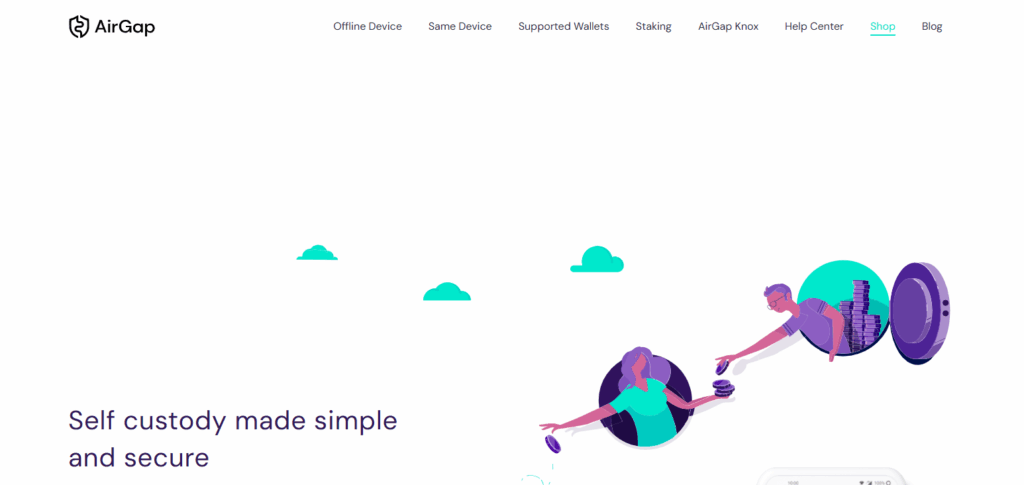
Furthermore, AirGap Vault’s offline setup, paired with AirGap Wallet’s installation on a different device, ensures that private keys are safe from any internet exposure. The added GPS control permits access only at predefined locations which makes remote unauthorized access nearly impossible. This combination of geofencing along with air gapped key isolation is what makes AirGap Wallet unique.
AirGap Wallet Features
- Two-Device Setup – AirGap Vault stores the keys offline, while the AirGap Wallet broadcasts online.
- Geo-Fence Transaction Trigger – Signs transaction only when both devices are within the permissible GPS range.
- Open-Source & Auditable – Provides full trust with open code for auditability.
6.Tangem Wallet
Tangem Wallet stands out as a GPS-locked crypto wallet because it integrates location-based unlocking with smart card hardware: the Tangem card GPS only unlocks transactions within configured circles with the paired app. This ensures that the card data cannot be used even when cloned or the card stolen, as it is tethered to a geographic boundary.
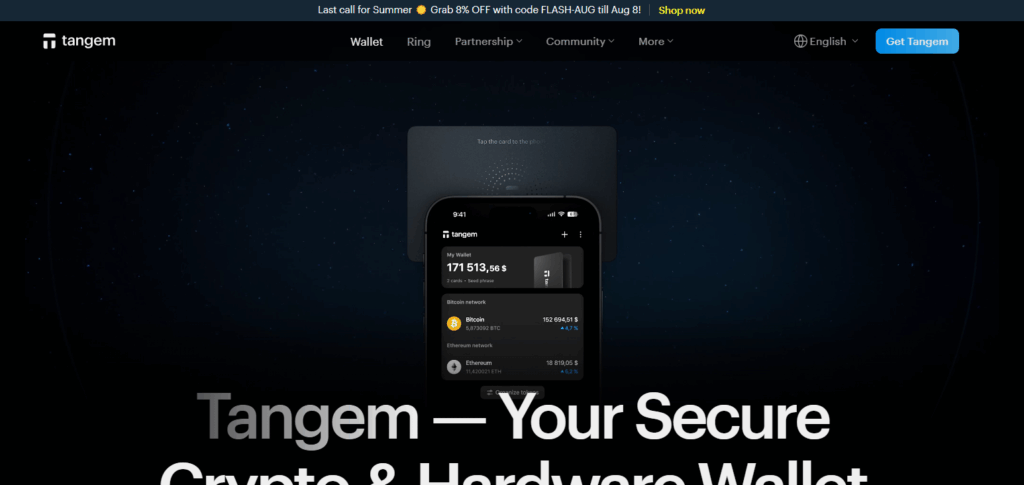
Its offline secure element which stores cryptographic keys is protected against insider attack. The restriction of location adds the contextual element of the physical world making unauthorized access exceedingly impossible unless the card is physically present and the right location.
. Tangem Wallet Features
- Smart Card Hardware – Requires NFC tap for access that holds keys in a tamper-proof chip.
- Location-Locked Signing – GPS-restricted NFC authorization works only within defined coordinates.
- No battery, Long Lifespan – No charging required, designed for decades of use.
7.Binance Web3 Wallet
The Binance Web3 Wallet is not GPS unlocking enabled, so it can’t really be called the best “only opens at certain GPS locations” wallet. It would be much more interesting if it added geofencing to its current self-custody, MPC-backed, seedless security framework, requiring the user to be within approved GPS coordinates before granting key-share reconstruction.
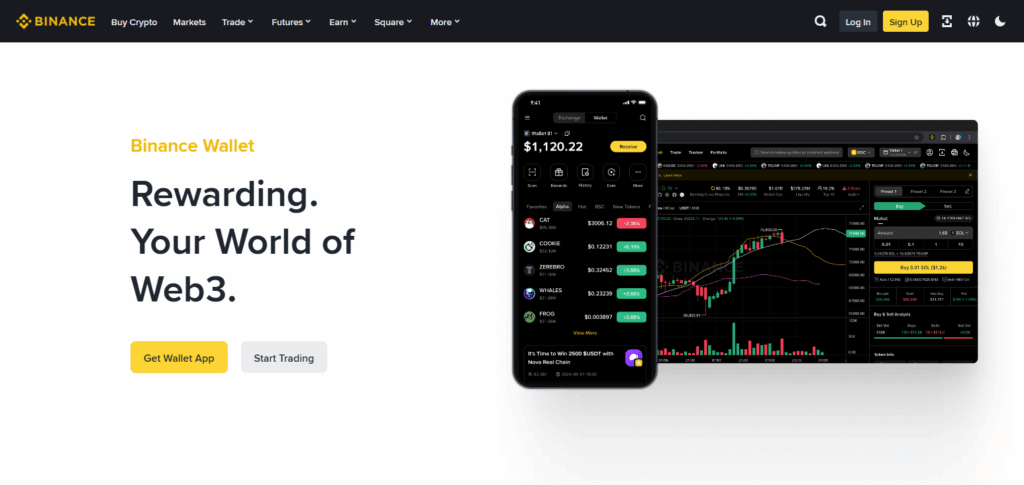
This would add a physical-location restriction blend with split-key cryptographic safety, making remote attacks much more difficult in the absence of the user. This illustrative combination would be its key differentiator.
Binance Web3 Wallet Features
- MPC Security – Private keys are split into fragments and stored across different servers and the user’s device.
- GPS-Restricted Key Reconstruction – Merges MPC with location checks for signing transactions.
- Integrated Exchange Features – Access Binance trading, staking, and swaps seamlessly.
8.Phantom Wallet
Phantom Wallet does not offer GPS-based unlocking, therefore, it doesn’t function as a “only opens at certain GPS locations” wallet. However, if it applied geofencing restricts based on location to its current self-custodial key control system and user-friendly multi-chain wallet, it would gain a powerful contextual defense.
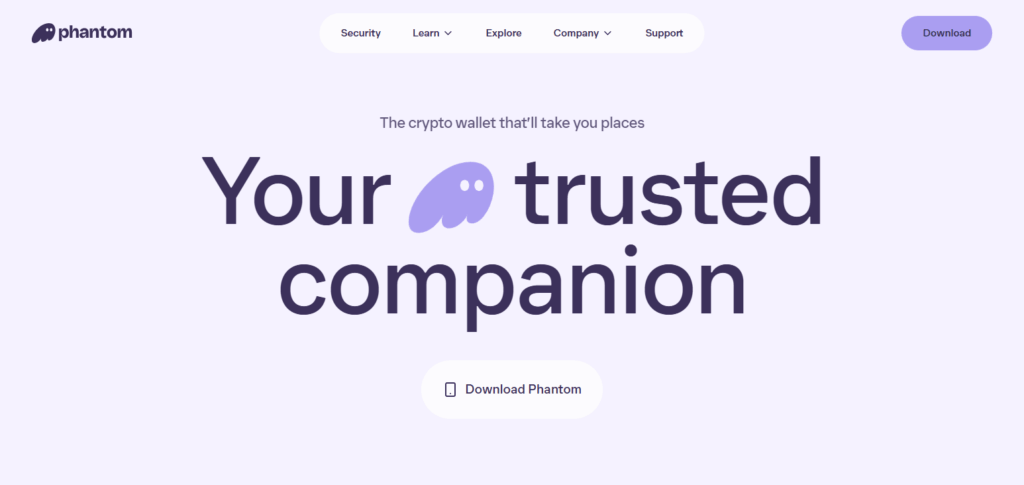
Supplementing its GPS location security with restrictions on approvement of certain coordinates to be physically present would further complement its breach-proof seed-phrase and dApp security, making remote compromise far harder without actually being there. That speculative location-based restriction amalgamation with Phantom’s self-custodial wallet would the its biggest advantage.
Phantom Wallet Features
- Non-Custodial Control – Keeps private keys encrypted locally, and fully in the user’s control.
- Geofenced Access Layer – Grants access within specified GPS coordinates for wallet unlocking and transaction signing.
- Multi-Chain Ecosystem – Solana, Ethereum, and Polygon blockchains are supported for NFT and DeFi activities.
Conclusion
The most secure crypto wallet that opens only at specific GPS locations uses precise geofencing and critical key protection as a two-layer security system.
Since both the geofence and the possession of the wallet need to be bypassed to access the wallet, the chances of remote hacks are greatly reduced.
Solutions such as AirGap and Tangem show how location-restricted access can provide maximum security due to offline key storage and hardware level protection. This mix of geography and cryptography unlocks unprecedented security for highly sensitive digital valuables.
FAQ
What is a GPS-restricted crypto wallet?
A GPS-restricted wallet only allows access or transaction signing when the user’s device is within preconfigured geographic coordinates, adding a physical-location layer to custody security.
Why add GPS location gating to a crypto wallet?
It prevents remote or unauthorized use—even if keys or credentials are leaked—because the wallet refuses to operate outside trusted locations, tying access to “something you have” and “somewhere you are.”
How is this different from standard multi-factor authentication?
Unlike typical MFA (which uses codes or biometrics), GPS gating enforces a contextual, environmental requirement: physical presence in a specific place, not just possession or knowledge.


